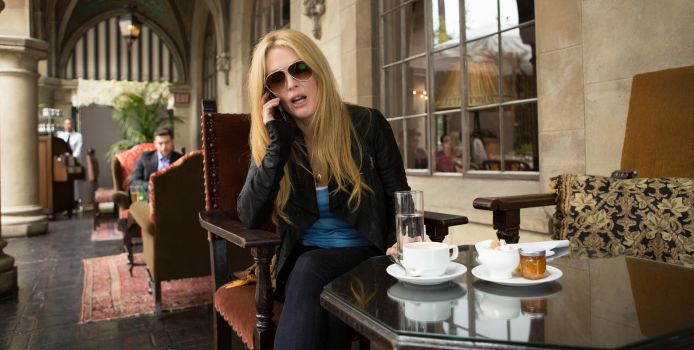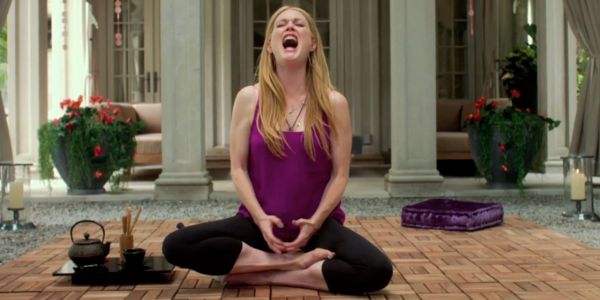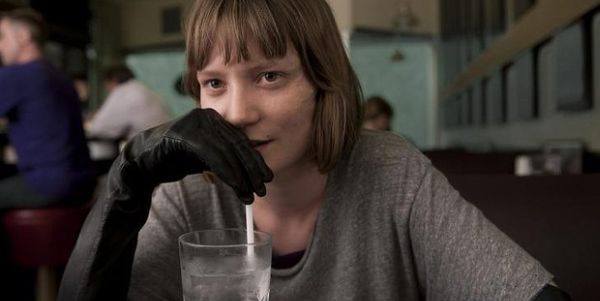MAPS TO THE STARS: A Brilliant Warped Satire

I'm a film buff from South East England. I run…
Maps To The Stars is about the aspects of Hollywood that, as a film fan, I‘d rather not think about. Written by the acerbic Bruce Wagner, it is about the cynicism of the industry, about the actors who are motivated by vanity and the money-minded executives who exploit them.
These people’s heads have been long removed from their shoulders, their molly-coddled lives are run by other people as they incessantly try and top up their serotonin through drink, drugs, sex and bastardised spiritualism with increasingly less success. It has been called ‘narratively unwieldy’ by the ‘tomato-meter’, and the events in the latter stages of the film are certainly dramatic and in quick succession, however Maps To The Stars is a great, grotesque satire from David Cronenberg, who could also be described in such terms!
Moore’s best performance of the year
Julianne Moore was great in Still Alice, but I think she’s better as the unhinged and crude Havana Segrand, a deeply warped, neurotic actress who’s haunted by the vivid apparition of her mother Clarice Taggart (Sarah Gadon), a famous actress who died in a fire. When she’s isolated in her large home, she’s never far away from a breakdown, and we see her experience particularly wayward instability as she obsesses over securing the lead role in the remake of a film her mother starred in.

Havana has expired her Hollywood leading lady shelf-life, however, she’s desperate to be at the forefront of the business. In the process she has ground herself down into a drug addled, hallucinating mess. Havana’s manipulative conversations with colleagues makes for awkward viewing, she fawns at a moment’s notice, even with people who privately drive her into psychotic episodes.
The perils of child stardom
Evan Bird is very good as Benjie, a child star who is often obnoxious but really a product of his clearly unhealthy environment. He is introduced to us in a hospital room as he visits a young terminally ill fan with Hodgkins Lymphoma; when presented with such misery he deals with it the only way he knows how: by arranging for her to be given an iPad. After this he has a brief argument with his adult assistant, the sweary exchange is concluded with Benjie calling him a ‘Jew faggot’.

His sometimes vulgar, churlish exterior belies a rather precocious character with an articulacy that’s beyond his years. Even when he’s unpleasant he’s not entirely loathsome, his language is so gratuitous that it was almost comical, especially when expressing his unashamed contempt for the sycophants around him. I suppose he was hard to take seriously, owing to his elongated neck and sloped, pre-pubescent shoulders.
Agatha (Mia Wasikowska) is a timid, unusual young woman who, with multiple burns across her body, is destined to fail in the industry. She’s in Los Angeles after corresponding with Carrie Fisher on Twitter, and Agatha soon finds herself being interviewed for the position of ‘chore whore’ for Havana. It is here that her burns actually help her odds in Hollywood, as the injuries remind Havana of her mother. It eventually arises that Agatha is in the city to ‘make amends’, unravelling a twisted cauldron of lies and incest.

John Cusack is also well-cast as Stafford Weiss, the self-help charlatan father of Benjie who is made very creepy by Cusack’s dark, dead eyes and blank expression. His wife is Christina (Olivia Williams) is a woman bereft of any charisma, who spends much of her time posturing anxiously with a cigarette in her hand.
The ordinary Hollywood wannabe
Unlike in Cosmopolis, Robert Pattinson’s character Jerome Fontana, a shy limo driver with ambitions of being an actor/screenwriter, is strictly a supporting one. In a film full of freaks, Jerome is the ordinary Hollywood wannabe, the one to whom we can most relate. However, it appears his foray into this glitzy, red carpeted hell is in its infancy. He mentions to Agatha early in the film, albeit half-heartedly, that he’s considering Scientology for better career prospects, which is an amusing dig at both fad culture and that unsettling religion.
I’m not sure what to make of the film’s final act, everything goes awry for the characters in a manner that is perhaps too fast and too crazy. I tried to get the measure of the aberrance and the immorality upon leaving the cinema, I wondered whether Maps To The Stars was grounded in much reality, I then remembered Natalie Wood, the Black Dahlia, Elliot Rodger and the myriad other of Hollywood’s victims, pill-poppers and prima donnas.
Do you think Cronenberg is back on form? Please let us know in the comment section below.
(top image source: Focus World)
Does content like this matter to you?
Become a Member and support film journalism. Unlock access to all of Film Inquiry`s great articles. Join a community of like-minded readers who are passionate about cinema - get access to our private members Network, give back to independent filmmakers, and more.
I'm a film buff from South East England. I run Hawkensian.com, which comprises mostly film reviews but also various opinion pieces on history and politics.













